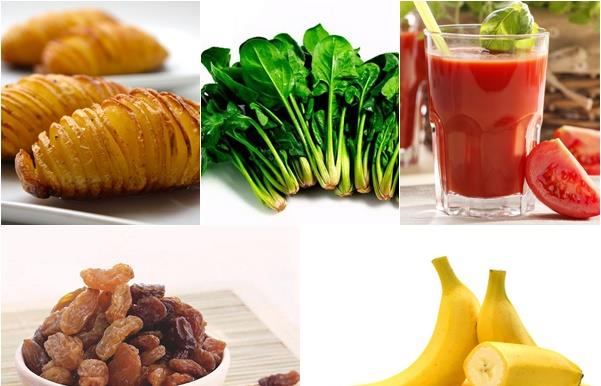Potassium is an important nutrient for maintaining the body's fluid balance as well as maintaining optimal blood pressure and helping muscles to contract, but currently, babies are only getting 60% less Potassium recommended. So how can mother overcome this situation?
To view this video please enable JavaScript, and consider upgrading to a web browser that supports HTML5 video
Pregnant women eat fish: Right dose, right type! (QC)
Many proteins, omega-3s and many minerals are beneficial for the body, but fish also contain mercury, a poison that is dangerous for mother and fetus. How to eat fish without having to worry about this problem?
see more
Effects of potassium on children's health?
Potassium is a simple mineral but plays a very important role in the body: It helps regulate the balance of water and electrolytes, helps maintain the normal functioning of organs, especially the cardiovascular system, the digestive system. chemistry, urinary system, and muscle activity.
The American Dietetic Association warns that potassium is one of the nutrients that school-age children are deficient in.

Supplementing vitamin A for children: Vitamin A deficiency or excess is an important role for the health and development of children. Besides dietary supplements, vitamin A is also taken into the body in the form of oral tablets. However, vitamin A supplementation for this child must be carried out carefully, to avoid leading to deficiency or excess ...
How much potassium supply is enough?
Along with sodium, potassium helps to balance water in the body, maintaining healthy blood pressure. Children 1-3 years old need to provide 3,000 mg per day, while 3,800 mg of potassium is essential for children aged 4-8 years.
In case of not getting enough potassium for the baby needed every day, mothers should not be too worried, but instead, calculate the average amount of potassium over a few days or a week to get a reasonable supplement.
Potassium is found in many foods. Fruits and vegetables are the most important sources of potassium: legumes and beans, apples, gourds, squash, bananas and papaya ... It should be noted that cooking in water reduces by 50 - 70% of the potassium in these foods. Therefore, we should steam or cook or eat raw to maximize the amount of potassium in the food. Potassium is also found in many types of fish, sea clams, yogurt, squash seeds, cereals, chocolate ...

Fruits and vegetables are excellent sources of potassium for children.
Some of the best sources of potassium include:
1/2 medium baked potato: 463 mg
- 1/2 cup of plum juice: 352 mg
1/4 cup prunes: 318 mg
1/4 cup raisins: 299 mg
1/2 cup of tomato juice: 278 mg
1/4 cup white beans: 251 mg
1/2 cup of orange juice: 248 mg
1/4 cup lima beans: 242 mg
- 29g sunflower seeds: 241 mg
1/2 medium banana: 211 mg
-1/4 cup spinach: 210 mg
- 28g almonds: 200 mg
1/2 tomato: 146 mg
1/2 cup cereal with raisins: 181 mg
1/2 orange: 118 mg
- 2 dried dates: 94 mg
1/2 cup watermelon: 85 mg
What if the child lacks or has excess potassium?
Low potassium levels in the child's body are often caused by diarrhea, frequent vomiting, diabetes , kidney dysfunction, aspirin, cortisone, diuretics, or excessive sweating. leading to dehydration. Symptoms related to potassium deficiency are arrhythmia, decreased muscle tone, fatigue, stress, decreased memory, increased blood pressure, bloating, or decreased bowel movements. Prolonged hypokalaemia will lead to disorders of the cardiovascular and nervous systems, which can even lead to muscle paralysis, and even death.
Potassium supplementation may be necessary in the case of hypokalaemia. However, it is best to consult a doctor because if the potassium level in the blood is too great, it is dangerous for the child.
It is important to keep potassium in the body in balance, as otherwise, in the long run side effects such as muscle weakness and cramps, intestinal disease and irregular heartbeat will occur.

Supplementing vitamin A for children: Vitamin A deficiency or excess is an important role for the health and development of children. Besides dietary supplements, vitamin A is also taken into the body in the form of oral tablets. However, vitamin A supplementation for this child must be carried out carefully, to avoid leading to deficiency or excess ...
>>> See more discussions with related topics:
Bananas are great for children
Provide vitamin C for children to increase resistance














